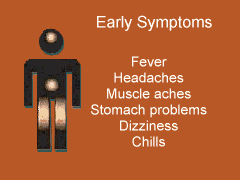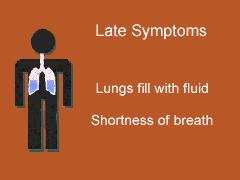|
What Are The Symptoms of HPS?
Early symptoms
Early symptoms include fatigue, fever and muscle aches, especially
in the large muscle groups-thighs, hips, back, and sometimes shoulders.
These symptoms are universal.
There may also be headaches, dizziness, chills, and abdominal problems,
such as nausea, vomiting, diarrhea, and abdominal pain. About half
of all HPS patients experience these symptoms.

Late symptoms
Four to 10 days after the initial phase of illness, the late symptoms
of HPS appear. These include coughing and shortness of breath, with
the sensation of, as one survivor put it, a "...tight band
around my chest and a pillow over my face" as the lungs fill
with fluid.
Uncommon symptoms
Earache, sore throat, runny nose, and rash are very uncommon symptoms
of HPS.
How long after contracting the virus do symptoms appear?
Due to the small number of HPS cases, the "incubation time"
is not positively known. However, on the basis of limited information,
it appears that symptoms may develop between 1 and 5 weeks after
exposure to urine, droppings, or saliva of infected rodents.
Another important point to remember from the data that the CDC Special
Pathogens Branch keeps on all reported cases of HPS, is that it
appears many people who have become ill were in a situation where
they did not see rodents or rodent droppings. Other people have
had frequent contact with rodents and their droppings before becoming
ill. This apparent inconsistency makes it very difficult to pin
down the precise time when the virus was transmitted.
|
All About Hantaviruses Home | General Information | Technical
Information | Contact
Us
CDC Home
| Search |
Health Topics A-Z
This page last reviewed
Thursday, August 5, 2004
Special Pathogens Branch
Division of Viral and Rickettsial Diseases
National Center for Infectious Diseases
Centers for Disease Control and Prevention
U.S. Department of Health and Human Services
 
|

 National
Center for Infectious Diseases
National
Center for Infectious Diseases National
Center for Infectious Diseases
National
Center for Infectious Diseases